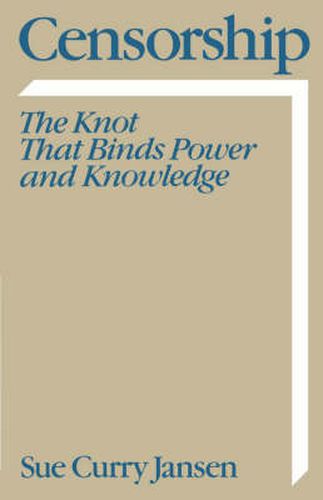Readings Newsletter
Become a Readings Member to make your shopping experience even easier.
Sign in or sign up for free!
You’re not far away from qualifying for FREE standard shipping within Australia
You’ve qualified for FREE standard shipping within Australia
The cart is loading…






Most Americans tend to view censorship as a repressive aspect of other societies or historical eras, one that touches on our lives only in relation to national security or certain cold war considerations. In this provocative history of censorship, Sue Curry Jansen challenges conventional thought with a bold new view: that censorship, an embodiment of the relationship between power and knowledge, is as much a feature of liberal, market societies as it is of totalitarianisms. Building on an analytic tradition laid out by such thinkers as Marcuse and Foucault, Jansen addresses the notion of market censorship and shows how the marketplace has become an arena for liberal power-knowledge.
She also analyzes Marx’s critique of bourgeois censorship, examines censorship at various levels of Soviet society, and takes an incisive look at economic censorship within our own capitalist nation. The book concludes with a discussion on strategies of resistance to this powerful, and indeed universal, form of social control.
$9.00 standard shipping within Australia
FREE standard shipping within Australia for orders over $100.00
Express & International shipping calculated at checkout
Most Americans tend to view censorship as a repressive aspect of other societies or historical eras, one that touches on our lives only in relation to national security or certain cold war considerations. In this provocative history of censorship, Sue Curry Jansen challenges conventional thought with a bold new view: that censorship, an embodiment of the relationship between power and knowledge, is as much a feature of liberal, market societies as it is of totalitarianisms. Building on an analytic tradition laid out by such thinkers as Marcuse and Foucault, Jansen addresses the notion of market censorship and shows how the marketplace has become an arena for liberal power-knowledge.
She also analyzes Marx’s critique of bourgeois censorship, examines censorship at various levels of Soviet society, and takes an incisive look at economic censorship within our own capitalist nation. The book concludes with a discussion on strategies of resistance to this powerful, and indeed universal, form of social control.